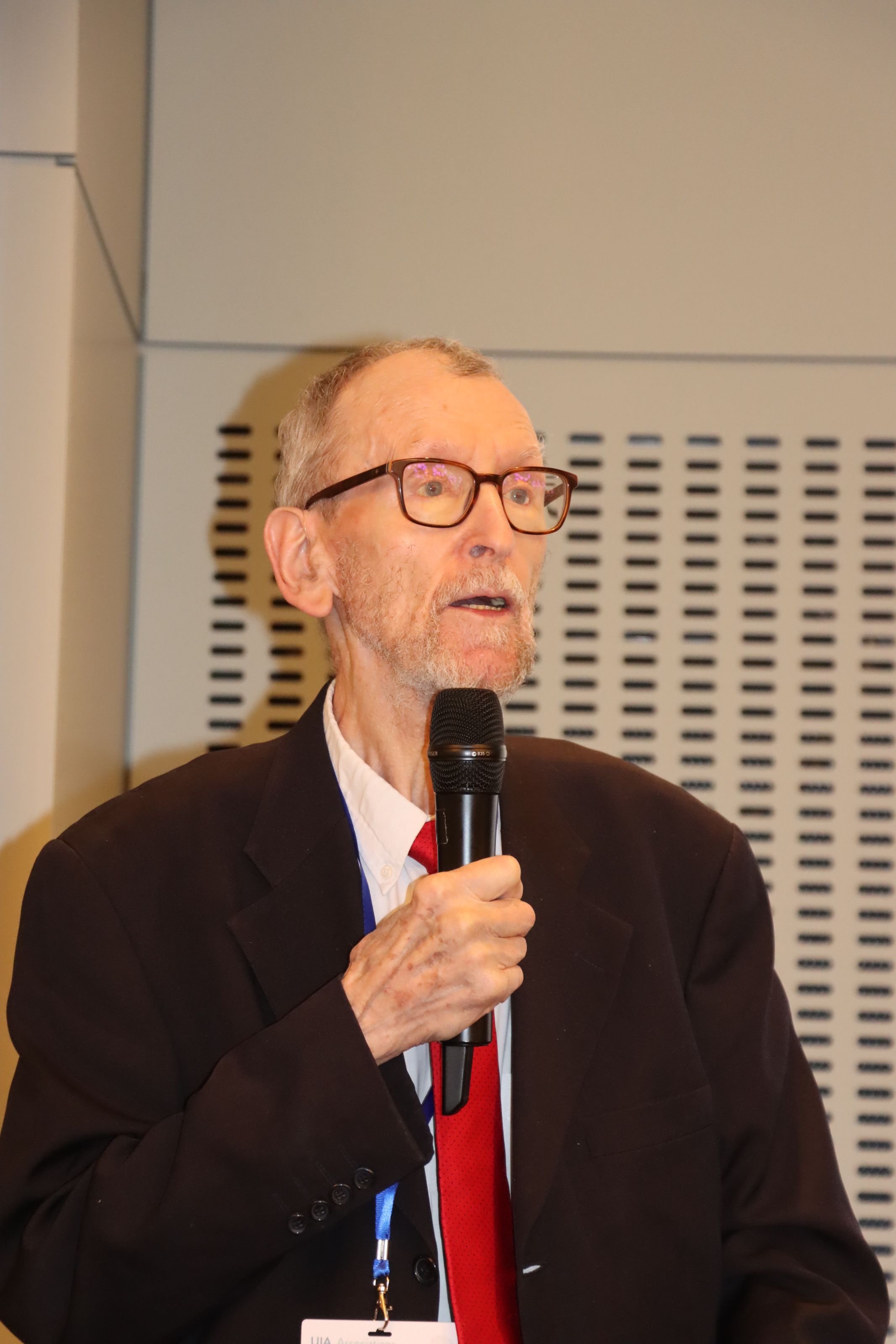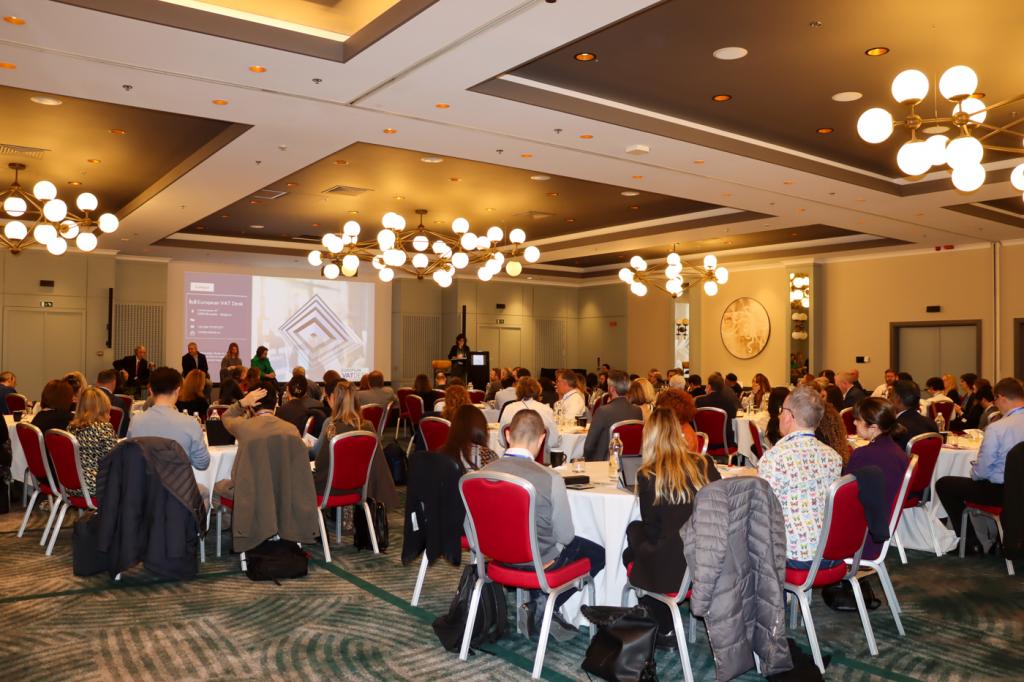
We are pleased to publish in our newsletter the keynote address of the President of the Union of International Associations, Mr Cyril Ritchie, presented at the UIA Associations Round Table held in Brussels on 24 November 2023.

When I spoke on these topics a year ago (at the Rotterdam UIA Round Table) I expected some lively reactions. And I received them! Perhaps surprisingly, most were favorable to hearing and joining in the discussion, underlining the right of each of us to the fundamental freedoms of opinion and expression. Associations are, after all, in the front line of promoting and practicing democratic debate. So I have chosen to make this 2023 Keynote a Chapter 2, to pursue with you the implications and complications of associations’ real-time engagement – and real-time survival – in today’s dangerous and increasingly bloodied world.
My starting point is, as always, that associations are plainly also in the front line of responding to world issues, not least those that arise from war and conflict. For in war and conflict, those who most need moral support, humanitarian relief, legal protection, medical treatment, and even aid in burying their dead relatives are the ordinary populations whose houses, schools, hospitals, cultural centers are suddenly destroyed, together with lives, incomes, souvenirs and prospects. Associations are often the first responders in such situations.
It is in such circumstances that one can only admire, commend and give support to the associations which make it their job (a) to relieve people’s physical and mental agony and despair and (b) to contribute to restoring hope and belief in their future. In the lifetime of many in this room we have seen destruction and devastation, including from civil wars, in Korea, China, Vietnam, Cambodia, Myanmar, Nigeria, the Democratic Republic of the Congo, Cyprus, the former Yugoslavia, Afghanistan, Iraq, Libya, Yemen, Syria, Sudan and South Sudan, and of course now once more in the Middle East. And over the last 18 months, the people of Ukraine are suffering in a war perpetrated by a Permanent Member of the United Nations Security Council whose Charter duty is to preserve international peace. Note also that the UN Food and Agriculture Organization (FAO) reports that as a direct consequence of the war against Ukraine, the number of chronically hungry people in the world has increased by 10 million.
So we must indeed recognize and pay tribute to the associations which act in all types of conflict: supplying food, water, shelter and medicine; assembling evidence of military attacks that may give rise to subsequent legal retribution; operating demining equipment; providing and driving ambulances; recording the existence of mass graves; tracing missing relatives; enabling the creation of jobs, and many other laudable initiatives that at the very least minimize suffering and provide pointers to the future.
Most people know of the famous phrase with which the Constitution of UNESCO, adopted in 1945, begins: ‘Since wars begin in the minds of men, it is in the minds of men that the defenses of peace must be constructed.’ Equally relevant to today’s topics are the following two phrases of that Constitution: ‘Ignorance of each other’s ways and lives has been a common cause, throughout the history of mankind, of that suspicion and mistrust between the peoples of the world through which their differences have all too often broken into war…The wide diffusion of culture, and the education of humanity for justice and liberty and peace are indispensable to the dignity of man and constitute a sacred duty which all the nations must fulfill in a spirit of mutual assistance and concern.’
These are clarion calls in a legal document adopted by governments, but which too many governments fail to put into practice. So much more meritorious is it, therefore, that thousands of associations have risen to the challenge of working day in and day out for peace, building bridges of culture, promoting and expanding education, notably for those most historically deprived of it, namely girls. It is benighted politics and patriarchy that are in too many countries depriving the girl child of her right to education, just as the same politics and patriarchy deprive women of their independence, their access to justice, equal wages, and sexual and reproductive rights. The innumerable associations, nationally and internationally, that campaign for all these rights, and take action to achieve them, are political actors of fundamental importance. They are not engaged in party or partisan politics, but in public policy actions that support and advance peoples’ aspirations for peace, for equality, for a better quality of life, and for conditions of decent living for future generations.
Associations are thus intrinsically engaged in politics because it is governments and parliaments that make policy in every area – parliamentarians and bureaucrats need to regularly hear the voices of citizens and citizens’ associations. Government ministers and parliamentary leaders need constantly to be presented with the views of grass-roots movements, of professional associations, of scientific and environmental groups that have real-life experience of bringing workable solutions to policy dilemmas. Governments and parliaments have no monopoly of wisdom. Nor of course do associations. But associations are dealing with, and must bring to the public policy arena, the day-to-day, month-to-month problems and aspirations of ordinary citizens – economic, social, educational, cultural, health-related, family-related, justice-related, including issues of gender and age discrimination.
The world will surely remain a troubling and distressful place. Many threats hang over our heads. One need only think of North Korea’s nuclear capacity and ballistic missiles, which are under the control of an authority whose population is 42% malnourished. The world is also collectively faced – just a short list – with thousands of migrants drowning; with ocean pollution; with djihadi movements in many countries; with the sharp escalation of the price of rice and cooking oils and electricity; with inadequate preparation for future pandemics; with government-sponsored assassinations and government-controlled surveillance; with future military competition in outer space; with the mysteries of Artificial Intelligence; with authoritarian or populist governments restricting not only media freedom but independent judiciaries and the right to peaceful assembly; with competing, overlapping and threatening geographical claims in the South China Sea; with continued trafficking in human beings; with the growth of drug dealing accompanied by the increasingly insidious power of drug cartels. And over and above all, there is climate chaos and biodiversity loss, not to mention the worldwide proliferation of nuclear and far too many other weapons that kill innocent citizens.
The purpose of reciting this long and doleful list is not to create depression! It is to indicate just how many areas of our planet’s tribulations have and desperately need the responsible input of associations and professional bodies of all shapes, sizes and constituencies. Planetary problems cannot be solved by governments only, still constrained as they are by the structures inherited from the 1648 Peace of Westphalia. The planet’s problems will also not be solved by politicians whose vision is focused on next year’s election results, rather than on future generations. The planet NEEDS the many associations that advocate for and act to achieve peace and justice, a green transition to a sustainable society, a safe and healthy working environment, disaster risk reduction, in short – Human Security.
Thus, associations are ipso facto political actors working for a Better World.
Dear Colleagues and Friends: I have endeavored to touch upon some aspects of the topic of ‘WAR, PEACE, POLITICS, ASSOCIATIONS’ as we together look forward to an uncertain 2024. The role of associations, the contributions of associations, in alleviating future uncertainty is critical, as we together work to maintain democratic standards, human and environmental rights, social justice, and the rule of law. Each association has its own role, its own constituencies, its own governors, its own donors, its own staff and volunteers. What associations share are human values and ethical principles. Let us seek more ways to cooperate, as and where we can, to achieve a peaceful and sustainable world for future generations.

Issue #8 – February 2024